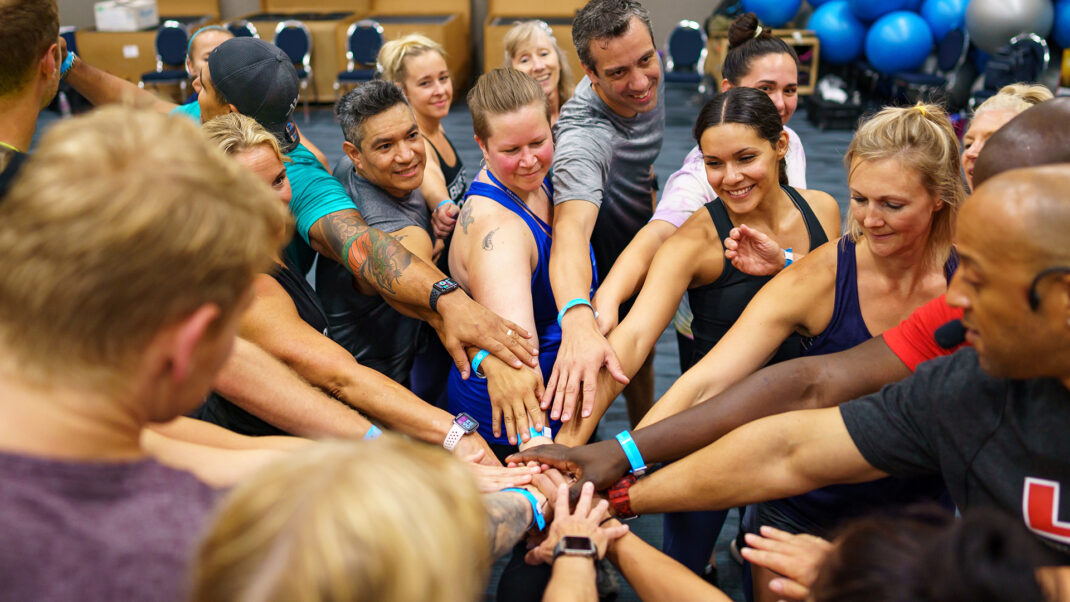The Mentor Connection
Finding a mentor can save you time, money and aggravation.

When I began my journey as a personal fitness trainer (PFT), I was clueless about what to do first. Though I’d successfully completed my exam, I quickly realized there was a lot more to this career than understanding anatomy and knowing how to execute a squat. I started to feel as though I was casting about in the dark, as there was so much I still needed to learn before I could feel comfortable working with clients.
Knowing full well that such confusion could hamper or delay future success, I decided to seek out an experienced professional to guide me. My experience with a mentor was greatly challenging—even painful at times—yet the knowledge I gained could not be gleaned from any textbook or Internet website. The Karate Kid couldn’t have overcome the treacherous Cobra Kai without the guidance of his sensei, Mr. Miyagi; Plato wouldn’t have advanced the field of philosophy without Socrates; so why would you try to Inspire the World to Fitness® without a mentor of your own? This article examines the benefits of working with a mentor, how to find one and how best to take advantage of the experience.
What Is a Mentor?
A mentor is a person who has achieved significant success and credibility in his field, has overcome obstacles and is willing to take the time to help a fellow professional move forward triumphantly. “Mentors are there to expose you to successful techniques,” says Todd Durkin, MA, 2004 IDEA Personal Trainer of the Year. “[A mentor] is someone who will hold you accountable for your goals and will save you time, money and lots of headaches.”
Mary Bratcher, MA, DipLC, and co-owner of The BioMechanics in San Diego, agrees: “A mentor is someone who is able and willing to clearly share their passion with other people in the profession.” Your own mentor will often be in a position in which you’d like to see yourself down the road; for example, she might be a well-respected PFT director or a PFT with a mile-long client waiting list.
While carving your own path is a necessary component of success, spending time with an experienced mentor can only help elevate your career, says Durkin. “You can’t fly with the eagles if you’re busy scratching around with the turkeys,” he quips. A mentor can also guide you away from pitfalls and be someone with whom you share difficulties and epiphanies. “I’ve had many mentors in the past that I continue to correspond with,” Durkin says. “These people have insights that literally saved me tens of thousands of dollars. I still continue to seek out mentors to help me grow personally, spiritually and professionally.”
Know Your Path
Before you begin the search for a mentor, you must determine what it is you’d like to gain from the experience. Not having a vivid picture in your mind of where you’d like to see yourself in the future can inhibit growth, and Durkin believes that understanding your natural inclinations can help you, not only to define your path more clearly, but also to choose the mentor who can guide you more effectively along that path. “Do you gravitate toward body-mind methods, rehabilitation, athletic performance?” asks Durkin. Knowing what you want ahead of time will help you narrow down the list of potential mentors.
For a new professional still unsure of where your talents lie, industry conventions are great places to find out what niche best suits your talents, says Bill Sonnemaker, PES, 2007 IDEA Personal Trainer of the Year. “Seek educational sources you might not consider,” he suggests. “Take an intro course on yoga or Pilates. Doing so helps open up the mind and causes you to think in different ways. It’s always important to gain exposure to something new.”
Durkin believes that reading industry journals is a great way to discover areas of interest. If your eye continuously homes in on articles about rehabilitation, you may already be well on your way toward finding a mentor.
Sometimes, uncovering true talent can be difficult, says Bratcher. “If you’re having trouble, you may not be looking in the right places. Perhaps that’s something you need to work on first. You might need help in figuring out an approach and so you may want to get a professional business consultation.”
Learn New Tricks
Mentoring PFTs does not always consist of helping them find direction. Many trainers are already familiar with the populations they want to work with, but they need guidance on how to enhance a specific aspect of their career. Sometimes it can be a skill, such as public speaking or time management. Sometimes the skill that is missing may not be easily discernable, says Bratcher.
People don’t always know what they want or what they need, which can make the search for growth somewhat difficult. So Bratcher suggests a bit of soul searching to uncover faults hiding below the surface. “Take a good look at yourself,” she says. “If you’re not familiar with what you need to learn, perhaps you might begin thinking about those things you put off until the last minute.” For example, if you always delay returning phone messages, it would behoove you to seek out someone well versed in this skill, such as a PFT who specializes in coaching over the phone.
“The mentor doesn’t always have to be a part of your profession, either,” adds Sonnemaker, who participates in his own mastermind group made up of professionals from other industries. “If you need to hone your business skills, I suggest looking for someone outside the fitness industry. They always have insights that those in our profession may not possess.”
Find Your Mentor
Now that you know what you want to gain from a mentor, it is time to hit the pavement and find the person who best suits your needs. But what are the most effective methods for doing this? A surefire way to determine whether your potential mentorship will be a success is to meet the mentor in person. Sonnemaker says that, when attending live education events, you should pay careful attention to the courses you enjoy and the presenters who offer them. “IDEA conferences are a great way to find out which professional(s) you’d like to learn from,” he says. “[They are] a great place to network with presenters who are at the top of the food chain and who are passionate about what they do. Many of them are open to meeting fellow professionals.”
Durkin finds that while reading and research can help you discover your passion, they can also lead you to a successful mentorship. “Read trade journals and books, and research the topics you are interested in,” he says. “If you like what you’ve read, the author might be someone you can work with.”
“The IDEA website also offers a PFT locator,” adds Sonnemaker. “You can use this tool to find a master-level trainer in your area who might make a good mentor. Certification agencies also offer searches on their websites. Look for those trainers who have multiple certifications or significant education.”
Working with an expert in your local community is often the best and most cost-effective option; however, those without access may have to travel to take advantage of a mentorship. “I’ve literally traveled all over the world to improve my skills,” says Durkin. “If you’re really interested in learning, you have to do whatever it takes to do so.”
Make sure that you don’t mind spending time with your mentor. “If you have a choice, you need to enjoy getting along with [the mentor],” says Bratcher. Otherwise you run the risk of overshadowing the experience with negativity if your personalities clash, she adds.
Make Contact
Once you have found a potential mentor, it’s time to take the first leap and make contact. In my own case, writing a formal letter of intention helped secure my place in a mentoring program. Some professionals, like Durkin, make the job easier by providing an official application and questionnaire. Durkin suggests making first contact by e-mail and asking questions about material the mentor has written or a workshop he has hosted. Bratcher understands that some people may have difficulty extending themselves in this manner, and believes that pulling from your own list of contacts may ease the anxiety of finding a mentor. “It is hard to connect with someone you don’t already have a mutual connection with,” she says. “Think about people you already know, and who those people know.” Alternatively she suggests signing up for free initial consultations with local professionals. “Find out how they work to see if they might be a good mentor. Be up-front and let them know you are interested in learning from them and if there is a way to work something out.”
Know What to Expect
If a mentorship program is to succeed, you first need to understand what you can expect from your mentor and what she will expect from you. “When we mentor people on a volunteer basis, it’s not as hands-on, because [we’re] trying to do it within the framework of business operations,” says Bratcher. “It consists of a lot more e-mail and phone interaction, and self-direction.”
Other programs offer previously determined goals, so the mentee is completely aware of what will take place. For example, before a mentee arrives at the Fitness Quest 10 facilities, Durkin and his associates prepare a schedule of events to make sure the person gets the maximum benefit from the experience. “We currently offer 1- to 3-day formal programs to provide information and coaching on the business of personal training, but I’m very selective in who I choose,” says Durkin. “Interested professionals complete a questionnaire that provides them an understanding of our business philosophy and gives me insights into what they want. This helps me find people who really want to learn.”
“Sometimes our mentees come in for days or even weeks,” says Sonnemaker. “They get to observe client assessments as well as shadow me or my trainers while we train,” he says. But Bratcher warns mentees to be mindful that although mentors want to help, they also have a business to run, so it is important to be respectful of their time and energy.
Get Ahead
Whether you require lessons in phone etiquette, want to learn recordkeeping or need to recharge your battery, a mentorship program can be a tremendously fruitful and enjoyable experience. It can enhance your skills and take your career to the next level. A mentor can clear up confusion, teach you trade secrets not readily available in textbooks and be a positive influence throughout your entire career.
Ryan Halvorson is the associate editor for IDEA and a certified personal trainer at Excel Sport and Therapy in La Jolla, California.
Ryan Halvorson
Ryan Halvorson is an award-winning writer and editor, and IDEA's director of event programming.






